翻译技巧-2
英汉翻译-常用翻译技巧2
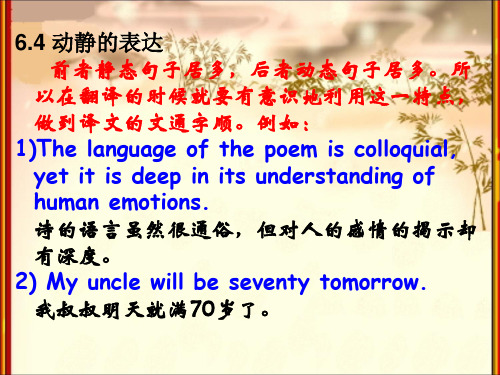
6.9 省译 省略是英汉翻译中最常用的技巧之一。 省略是英汉翻译中最常用的技巧之一。 从语法上讲,英语中的代词 连接词、 代词、 从语法上讲,英语中的代词、连接词、介词 等使用频率远高于汉语, 等使用频率远高于汉语,所以翻译成汉语时很 多情况下都可以省略。 多情况下都可以省略。 从修辞的角度来看,为了句子的简洁, 从修辞的角度来看,为了句子的简洁,有的 时候原文中不可缺少的实义词 原文中不可缺少的实义词在译文中却可有 时候原文中不可缺少的实义词在译文中却可有 可无,这个时候也可以应用省略的技巧。 可无,这个时候也可以应用省略的技巧。 但是有一个原则就是,省略不可有损于原义。 但是有一个原则就是,省略不可有损于原义。
2) His failure to observe the safety regulations resulted in an accident to the machinery. 因为他没有遵守安全规则,机器出了故障。 因为他没有遵守安全规则,机器出了故障。 3) In the doorway lay at least twelve umbrella of all sizes and colors. 门口放着一堆雨伞,少说也有十二把, 门口放着一堆雨伞,少说也有十二把,五颜六 大小不一。 色,大小不一。
6.5 定语的翻译 英汉两种语言在定语方面的区别是: 英汉两种语言在定语方面的区别是: 首先是位置问题, 首先是位置问题,英语中的定语可以放在被修 饰名词的前面或者后面, 饰名词的前面或者后面,而汉语的定语一 般只放在被修饰名词的前面; 般只放在被修饰名词的前面; 其次是在数量方面, 其次是在数量方面,英语中修饰一个名词的定 语可以有几个,而在汉语中, 语可以有几个,而在汉语中,放在名词前 面的修饰语数量较少, 面的修饰语数量较少,更多的情况是作为 形容词句放在名词后面起说明作用。 形容词句放在名词后面起说明作用。 这样在翻译实践中, 这样在翻译实践中,要经常考虑到调整定 语顺序的问题。 语顺序的问题。
翻译技巧(2)词语选择

例2: My dogs are killing me.
【误】我的狗要咬死我了。 【正】我的双脚疼死我了。
例3:He didn’t speak (for) long.
【误】他长时间没有说话了。
【正】他说话时间不长。
例4: I bought a tape-recorder for a song.
【误】我买一台录音机来听唱歌。 【正】我廉价买了一台录音机。
词义选择应注意的几个问题:
1.词义选择,避免望文生义
受原文表层语法结构的影响和字面意
思的束缚,对约定俗成、固定搭配、成语
等易产生望文生义的错误。
例1: “I will teach him to deceive others,” he said.
【误】他说,“我要教他去欺骗别人。” 【正】他说,“我要告诫他不要骗人。”
• 动物的隐喻性意义: • 由于人们对日常生活中常见的动物比较熟 悉和了解,语言中用动物来作隐喻的例子很多。 • 猴子:精明;灵活;瘦小 • 猪: 笨;懒惰;贪吃;脏; 轻手轻脚;嘴馋 • 猫: 奴性;凶恶;走狗,狗头军师;狼心狗肺;狗东西 • 狗: 狡猾 • 狐狸: 凶狠;有生气;虎视眈眈;龙腾虎跃; • 虎: 霸道;凶;无理 • 母老虎: 美丽、骄傲 • 孔雀:
• 5) Don’t tell stories again, Tom. I don’t believe your stories. • 6) It is quite another story now. • 7) He storied about his age.
2. Choice of the meanings
6) I have lost sight of my old friend for many years. 【译文】我已多年未得到老友的音讯。 7) The Great Wall in China is one of the sights of the world. 【译文】中国长城是世界名胜之一。 8) The Statue of Liberty is a noble sight. 【译文】自由神像是一个宏伟的景物。 9) It is worth a long sight more than that. 【译文】这个比那个价值高的多。 10) Do what is right in your own sight. 【译文】做你认为对的事。
翻译学丛:常用英语翻译技巧(2)
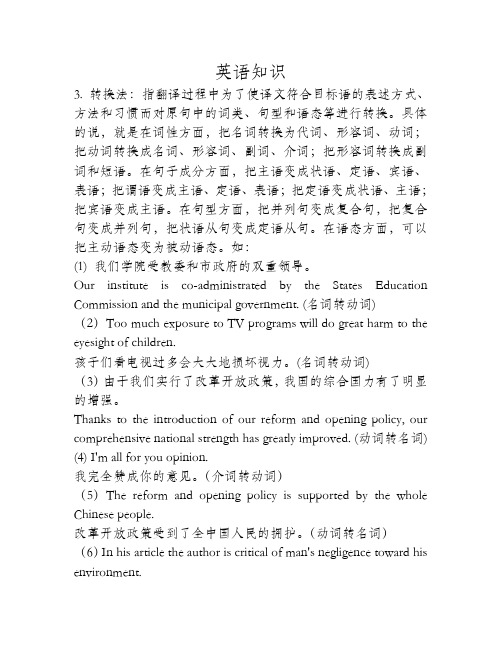
英语知识3. 转换法:指翻译过程中为了使译文符合目标语的表述方式、方法和习惯而对原句中的词类、句型和语态等进行转换。
具体的说,就是在词性方面,把名词转换为代词、形容词、动词;把动词转换成名词、形容词、副词、介词;把形容词转换成副词和短语。
在句子成分方面,把主语变成状语、定语、宾语、表语;把谓语变成主语、定语、表语;把定语变成状语、主语;把宾语变成主语。
在句型方面,把并列句变成复合句,把复合句变成并列句,把状语从句变成定语从句。
在语态方面,可以把主动语态变为被动语态。
如:(1) 我们学院受教委和市政府的双重领导。
Our institute is co-administrated by the States Education Commission and the municipal government. (名词转动词)(2)Too much exposure to TV programs will do great harm to the eyesight of children.孩子们看电视过多会大大地损坏视力。
(名词转动词)(3)由于我们实行了改革开放政策,我国的综合国力有了明显的增强。
Thanks to the introduction of our reform and opening policy, our comprehensive national strength has greatly improved. (动词转名词) (4) I'm all for you opinion.我完全赞成你的意见。
(介词转动词)(5)The reform and opening policy is supported by the whole Chinese people.改革开放政策受到了全中国人民的拥护。
(动词转名词)(6)In his article the author is critical of man's negligence toward his environment.作者在文章中,对人类疏忽自身环境作了批评。
句子翻译技巧二英译汉

1
There be 结构
❖ 带地点状语的there be结构 1、译成带主语的“有”(原句中的地点状语作主语) 2、译成无主句的“有”(“某处有……”)
8. The value of loss in this equation is so small that we can overlook it. 在这个方程式中,损耗值小到可以忽略不计。
1
9. Ocean-going ships, equipped with radar, are safe from collision with other ships. 远洋船只要装上雷达后,就不会跟其它船只相撞。
7. The wind was so strong that we could hardly move forward. 风刮得那么大,我们简直寸步难行。
8. We had been dismayed at home while reading of the natural calamities that followed one another for three years after we left China in 1959. 我们于1959年离开了中国。此后,中国连续三年遭到自 然灾害。当我们读到这方面的消息时,心里颇为不安。
1
4. I’m wondering if the heart of all new ideas lies in the borrowing, adding, combining or modifying of old ones. 我想知道:一切创新,实质上是否就是对旧事物的借鉴、 充实、组合或修改。
翻译常用技巧2
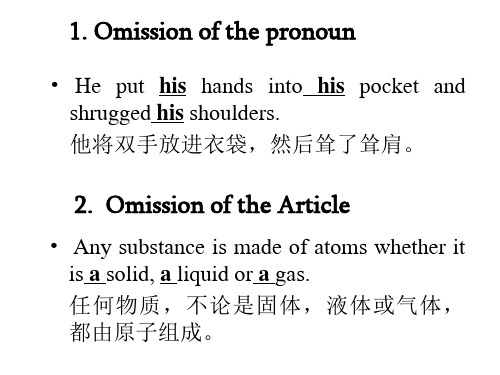
back
句子成分、语态转换
• 1. Brussels fell to him on September 3 and Antwerp the next. • 他于9月3日攻克了布鲁塞尔,次日又拿下 安特卫普。 • 2. They were attended from morning to night by female helpers, wives and nurses and secretaries. • 从早到晚,都有妻子、护士、秘书这样的 女帮手服侍他们。
Conversion转换法
• 定义 • 词性转换 • 句法成分、语态转换 • 叙述角度、表达方式转换
• Exercises
• This watch never varies more than a second in a month.
这块表一个月的误差从不超过一秒钟。
• Rockets have found application for the exploration
II. Omission in C –E Translation
Omission in C-E translation is employed in three circumstances: generally
• redundant words in original Chinese, such as unnecessary repetition and wordy expressions; • the original meaning that has already been implied in the context of English version;
of the universe.
火箭已经用来探索宇宙。 • Careful comparison of them will show you the difference. 只要仔细把它们比较一下,你就会发现不同之处。
句子翻译技巧(二)英译汉
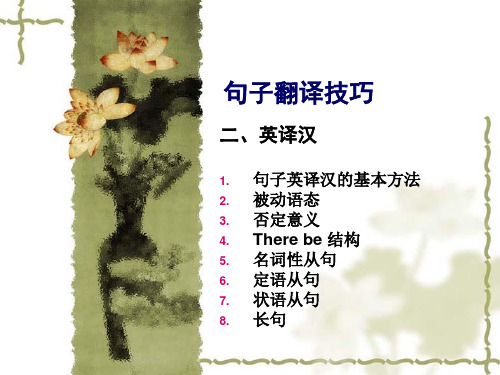
名词性从句
❖ 主语从句 1、由关系代词引导的主语从句,一般可按原文语序 翻译 2、由it作形式主语的主语从句,翻译时位置可前可 后
❖ 宾语从句 翻译时一般不需要改变其位置。(it作形式宾语或 介词宾语时,适当调整语序)
9. Every moment of every day, energy is being transformed from one form into another . 每时每刻,能量都在由一种形式变为另一种形式。
10. The pyramids stand huge and silent. 金字塔巍然耸立,庄严肃穆。
6. There is another problem in referring to the USA, since some Latin American countries are also “United States.”. USA这个称呼还有另外一个问题,因为某些拉丁美洲国 家也是United States(“合众国”) 。
❖ 简单句:只有一个主语和一个谓语的句子称为简单句。 ❖ 复合句:复合句由一个主句和一个或一个以上的从句
构成。
句子英译汉的基本方法
2. 句式变化
① 时间顺序 ② 逻辑顺序
句子英译汉的基本方法
其他情况(描述与评论的顺序):
❖ It is important that everyone does his duty. ❖ 每个人各司其责,这一点是很重要的。
3. The time was when we were happy and gay. 那时候我们无忧无虑。
翻译技巧2 Converting
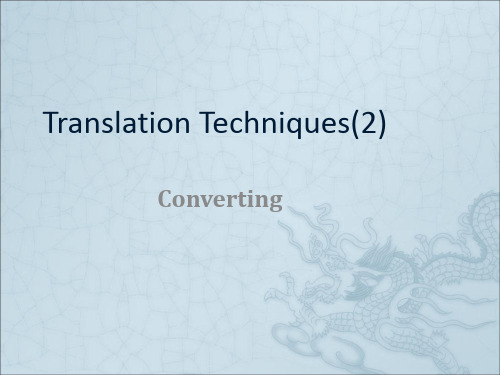
Converting into Nouns
–
A Verbs Converted into Nouns
•
1. Verbs transformed from nouns(名词转化的动词)
•
•
• •
e.g. The design aims at automatic operation, easy regulation, simple maintenance and high productivity. 设计的目的在于自动操作、调节方便、维护简易、 生产率高。 e.g. To them, he personified the absolute power. 在他们看来,他就是绝对权威的化身。
Converting into Adverbs
–
A Adjectives Converted into Adverbs:
•• • •Fra biblioteke.g. Only when we study their properties can we make better use of these materials. 只有研究这些材料的特点才能更好地利用它们。 e.g. A helicopter is free to go almost anywhere. 直升机几乎可以自由地飞到任何地方。
–
C Adverbs Converted into Nouns
•
• •
e.g. Nowadays many people in the society are materially rich but spiritually poor. 当今社会中,有许多人物质富有却精神空虚。
–
D Pronouns Converted into Nouns
汉译英翻译常用技巧2

3. 我们学院受教委和市政府的双重领导。 Our institute is co-administrated by the States Education Commission and the municipal government. (名词转动词)
4. 由于我们实行了改革开放政策,我国的综合国 力有了明显的增强。 Thanks to the introduction of our reform and opening policy, our comprehensive national strength has greatly improved. (动词转名词)
5. 林则徐认为, 要成功地禁止鸦片买卖, 就得 首先把鸦片焚毁。 Lin Zexu believed that a successful ban of the trade in opium must be preceded by the destruction of the drug itself.
2. 这种人闹什么东西呢?闹名誉,闹地位,闹出风头。 What are they after? They are after name, after position, and they want to cut smart figure将具有动作 性的名词转换为汉语的动词,或者将可表示概念 的动词转换为汉语名词。
汉译英时则反其道而行之。
•
For students of composition, an awareness that rhetorical patterns differ from one culture to another can help them become more quickly proficient in a writing pattern that is not native to them.
- 1、下载文档前请自行甄别文档内容的完整性,平台不提供额外的编辑、内容补充、找答案等附加服务。
- 2、"仅部分预览"的文档,不可在线预览部分如存在完整性等问题,可反馈申请退款(可完整预览的文档不适用该条件!)。
- 3、如文档侵犯您的权益,请联系客服反馈,我们会尽快为您处理(人工客服工作时间:9:00-18:30)。
• 2。从修饰的角度进行省略 • The hardest part of any big project is to begin. 任 何一个大的项目最艰难的是起步。 • The problem of alternative fuels of vehicle is one problem we shall approach. • 车辆的代用燃料是我们将要着手处理的一个问题。 • Walking for walking’s sake may be as highly laudable and exemplary a thing as is held by those who practice it. 经常散步的人认为,为散 步而散步是值得高度赞扬和仿效的。
• 总结,要克服翻译症,必须解决好以下几个环节 的问题: • 首先要克服认识的片面性,一般来说,有翻译症 倾向的译者,在翻译标准的把握上,比较重视忠 实,忽视通顺,而在处理内容和形式这对矛盾中, 又过于强调形式上的对应,忽略了对原文精神的 准确把握。 • 第二,在语汇问题上,切不可望文生义,也不可 盲目照搬辞典里的释义。 • 第三,在句法上不要全盘欧化,即异化。而要适 度考虑归化法。也即是向汉语行文文法靠拢。
• 英语中常用省略句,翻译时要根据汉语的表达习 惯,作些适当的增补。例如: • Histories make men wise; poems witty; the mathematics subtle; natural philosophy deep. 饱 读史书使人明智,吟诵诗篇让人诙谐,研究数学 使人严谨,精通哲学让人深邃。 • Staycations became popular during the financial crisis of 2007-2009, amid growing unemployment and rising gas prices. • 居家度假的形式在2007至2009年金融危机期间失 业率和油价不断攀升的情况下大受欢迎。
练习
• 1. Over the last couple of decades there’s been a tremendous explosion in museum attendance, and I see that continuing.(增动词) • 2. The choicest gold is to be had for digging.(增 digging. 连词) • 3.To learn is not an easy matter and to apply what one has learned is even harder.(减词) • 4. Standing as it does on a high hill, the church commands a beautiful view.(减词)
1-1 为了语法上的需要 英语中没有量词,汉译时就要加上。 a tv set a martial music an official a criminal I whispered and listened, but there was no response. 我轻轻喊了一声,然后听了一下,可 是没有听到任何反应。
减词
• • • • 1。从语法角度进行省略 We have more water than earth on this globe. 在地球上,水比陆地占得面积大。省略代词 I framed the words in my mind: “ Pardon me, but have I done anything to offend you?” 我心里在 嘀咕:“对不起,我做了什么事冒犯你了吗?” (省略代词,连词) • As it is late, let’s go to bed. 不早了,睡觉吧。 • 省略连词As 和祈使结构let us.
• 2. 照搬原文的功能词 • 英语属于形合语言,所以行文中必须要用到很多 功能词,而汉语是意合语言,不必在词语和句子 之间用很多功能词。如英语里的when, or, and, by, so… that 等等,不必照翻。 • At Eton the boys stand in a cluster and lift their hats when their names are called. • 在伊顿,学生们站在一起,当他们的名字被叫到 的时候,就举举帽子。 • 在伊顿,学生们站在一起,叫到名字就举举帽子。
• 英语中有一些形容词以及动词或形容词派生来的 抽象名词,翻译时也可根据上下文在其后增加适 当的词语,使译文意思明确,符合汉语表达习惯。 例如: • From the evaporation of water, people know that liquids can turn into gases under certain condition. 人们从冰的蒸发现象得知,液体在一定 条件下能转变为气体。 • 而反过来,如果把这句汉语译为英语,则“现象” 这个词是无需翻译的。这种情况我们会在讲汉译 英谈到。
• I wondered how she would feel if she learned • That the Negro before whom she had behaved in such an unlady-like manner was habitually a white man. • 我心想:她在一个黑人面前表现得这样没有淑 女风度,如果她得知这个黑人习惯上是个白人 时,不知她会有什么感觉。 • 她心下思忖:在一个黑人面前表现得如痴有失 淑女风度,她若是得知这个黑人其实是个白人 时,不知作译症的原因: • 1. 照搬英汉词典的释义 • I believed then that I would die there, and I saw with a terrible clarity the things of the valley below. • 这时我觉得我要死在哪儿了,而且清晰得 可怕地看见了下面山谷里的景物。 • 当时我觉得我要死在那儿了,而下面山谷 里的景物却看得异常清晰。
homework
• Investors are numb on inflation because the interest rate hike is not expected to have much of a den on the plentiful liquidity in the market. • But A-share market bubble is accumulating quickly as the stock prices surge, and this involves the risk of bigger fluctuation. • Stocks in resources sector led the increase yesterday, triggered by the rise of international resources prices due to the depreciation of the US dollars.
• 英语动词有时有体的变化,有语气,而汉语动词 没有对等的表现形式,翻译时常常需增加一些表 示时,体和语气的词才行,如: • The surgeons weren’t sure how long my new joints would last. But they’re holding up fine. • 当时不能肯定。。。但他们至今。。。 • She would spend hours dressing herself in fine clothes, and brushing her black hair. Then she would stand by the mirror and admire herself. • 她总是要花几个。。。, 之后她还常常会照着。。 • 自我欣赏一番。
• 英译汉有时有必要增加合适的名词,动词,形容 词(或是功能相当于形容词的名词)或副词,使 译文意思清楚无误。例如: • Fortune knocks at every man’s door once in a life, but in a good many cases, the man is in a neighboring saloon and does not hear her. • 每个人的一生中,幸运女神都只来敲一次门,可 是许多情况下,那个受到眷顾的人竟在隔壁的酒 馆里,因而错过了这敲门声。
• 英语的可数名词有单复数之别,汉语则没 有。 翻译时有时有必要增补恰当的词语以 便传达这一含义。 • The lion is the king of animals.百兽之王 • The slogan “Press on” has solved and always will solve the problems of the human race. “坚持下去” 的口号已经解决 并将继续解决人类的各种问题。
• 3. 照搬原文的语序 • 翻译症的另一个常见病,是译者冲不破原 文结构的束缚,一味照搬原文的句序,语 序,导致了译文的走形。例如: • In consequence of his decision, I was in due course placed in the third, or lowest, division of the Fourth, or bottom, Form. • 由于他的决定,我给及时地编入了四年级 (也即是最低年级)的三班(也即是最低 一班)。 • 由于他的决定,我给及时地编入了四年级 三班,也就是最低年级的最低一班。
翻译技巧-2 增词和减词
• 1。增词 • 英汉两种语言由于表达方式不尽相同,翻 译时常常有必要在译文的词量上作适当的 增加,使译文既能忠实地传达原文的内容 和风格,又能符合译入语的表达习惯。增 词一般用于3种情况:一是为了语法上的需 要,二是为了意义上的需要,三是为了修 辞上的需要。
